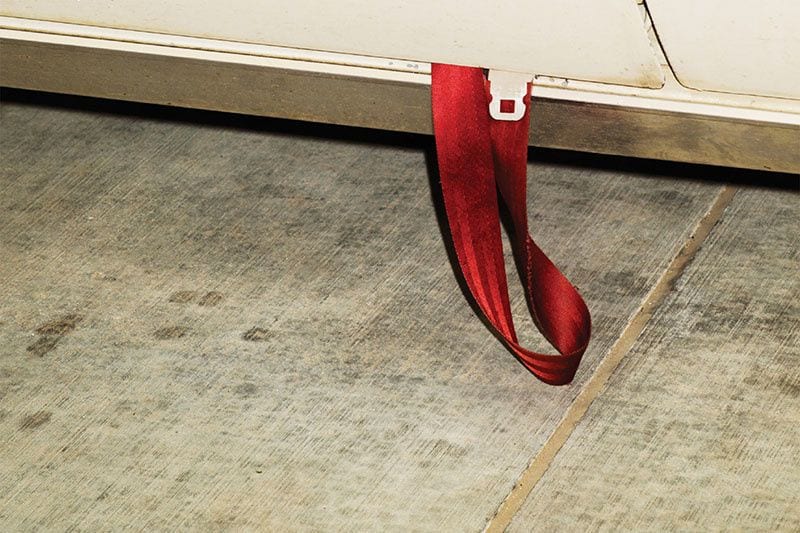
Mirror, Shoulder, Signal, Dorthe Nors’ meditation on the lives of women caught between youth and middle-age, is what an Anne Rivers Siddons novel might read like if it had originally been written in Danish. One of Denmark’s most lauded authors currently writing today, Nors’ work usually explores the lives of middle-class women who are upended by some emotional hiccup that leaves them in a state of existential wonder. In her latest novel, it’s a dissolved relationship that has her protagonist, the 30-something Sonja, running in all directions – learning to drive, trying to make new friends, and reconnecting with her estranged sister.
Mirror, Shoulder, Signal is essentially the narrative of a woman refusing to accept that youth is no longer on her side and the ordeal of having to readjust once her dependable comforts are no longer comforts (namely, her secure job as a translator of popular crime novels and a steady relationship). Nors charts Sonja’s progress with a meticulous hand, detailing the heroine’s exploits with studied resolve. But the narrative meanders aimlessly. Nothing in Nors’ novel ever feels as though it’s moving along a steady trajectory of human experience. Rather, the novel seems more like a series of joint recollections that don’t always connect thematically.
Sonja is a pleasant enough character but her problems seem trivial at best, her challenges no more than the inability to drive a stick shift or pen her sister a simple letter. In real life, these issues are minor nuisances discussed over coffee. In Nors’ book, they are deeply wounding traumas of herculean proportions. Frustratingly, Nors’ doesn’t have Sonja do much other than bite her tongue in tense situations or dodge people she doesn’t like very much (including her first driving instructor, a raging, blathering lunatic, and her well-meaning but probing massage therapist).
The conversations, thus, become a vacuous pool of angst-ridden musings. While engaged in a discussion with her massage therapist about her inability to talk to her sister or drive a car, Sonja stares at a hole in the floorboard and we are transported to a memory of her staring at holes in the floorboards of her childhood home. It’s supposed to signify Sonja’s incapacity to let go of her adolescent fears, but it feels like a meaningless aside in the idle talk.

Indeed, many moments throughout the novel are filled with such circular and wearisome ruminations. It’s tedious and stilts any momentum that is achieved when any form of action takes place. At some point early on in the book, Sonja is taking a driving lesson with her driving instructor Jyte, who loses it on the road when Sonja has trouble maneuvering her car through traffic. It seems to foreshadow the issues that will be revealed regarding Sonja’s sister. The sense of mounting tension that builds over the next couple of chapters concerning her wrangles with Jyte is extinguished, however, when Sonja opts to switch driving instructors. Every sidestepping of a problematic area in Sonja’s life upends a tension of conflict and we are left with nothing but her ingratiating self-pity.
It’s almost certain that Nors is a fine writer who knows how to turn wonderfully sculpted prose; her way with descriptors and metaphor suggests it. But perhaps the translation from Danish into English renders the text, at times, a little awkward. A number of sentences seem to carry two stray thoughts at once, perhaps the result of the translated diction. This makes it a little difficult to work out some of the inner dialogue; Sonja’s cogitations are tangents that often end nowhere after pages of emotional outpour.
Mirror, Shoulder, Signal is, in fact, a series of glimpses of the life of a woman who ponders laboriously over her next steps. Nors provides an informative and careful sort of journalism here that captures the thought patterns of humans in the throes of anxiety. But the narrative is almost always detached and, though affably related, rather cold.
Nors has had a good amount of success with her previous books, Karate Chop (Graywolf, 2014) a collection of short stories and So Much for That Winter (Graywold, 2016) which combines two of her novellas. Judging from her ability to harness the smaller, almost undetected, disturbances of human emotion in just a passage – no small feat, to be sure – perhaps her strengths are far better suited to the form of the short story and novella, where such reflections needn’t be stretched at novel’s length.
Mirror, Shoulder, Signal was a finalist for the Man Booker Prize in 2017. Clearly, Nors’ talents for outlining the rarely observed pathos that does indeed exist in the most minute moments of life’s chaos were not overlooked by the Booker advisory committee. It’s a shame, then, that Nors didn’t manage to coordinate all the emotional directives into a satisfying and cohesive arc here. A book of impressions, then.

